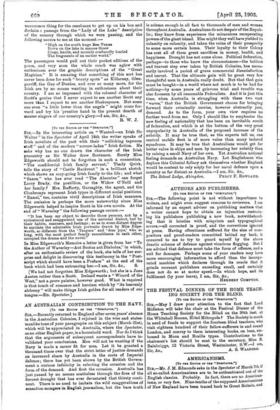AN AUSTRALIAN CONTRIBUTION TO THE NAVY. [To THE EDITOR or
THE "SI.ZOTATOB.."] SIR, —Recently returned to England after seven years' absence in the Australian Colonies, I rejoiced in the wise and states- manlike tone of your paragraphs on this subject (March 21st), which will be appreciated in Australia, where the Spectator, as no other English paper, is a household word. Nor do I think that the arguments of subsequent correspondents have in- validated your conclusions. Men will not be wanting if the Navy is made a career fit for men. Let it be granted a thousand times over that the strict letter of justice demands an increased share by Australia in the costs of Imperial defence ; there has yet been shown by the British Govern- ment a curious infelicity in selecting the occasion and the form of the demand. And first the occasion. Australia has just passed by no means scatheless through the fires of the fiercest drought that has ever devastated that thirsty conti- nent. There is no need to imitate the wild exaggerations of sensation-mongers in English journalism, but the bare truth
is solemn enough in all fact to thousands of men and women throughout Australia. Australians do not despair of the Repub- lic ; they know from experience the miraculous recuperating powers of the giant island. Else might they well have yielded to calamity on calamity, and taken the ruins of their prosperity to some more certain home. Their loyalty to their Colony has cost all of them great sacrifices in money, health, and happiness. Drought has not come alone. Political federation, perhaps—to those who know the circumstances—the boldest and bravest step ever taken by British Colonies, has neces- sarily involved a period of grave commercial dissatisfaction and unrest. That the ultimate gain will be great very few thoughtful men in Australia really doubt. But that that gain must be bought—in a world where not much is to be had for nothing—by some years of grievous trial and trouble was also foreseen by all reasonable Federalists. And it is just this time, when Australia is struggling with these two vast "waves," that the British Government choose for bringing forward their criminally unwise, however abstractly just, demand. As to the form, your own view requires no further word from me. Only I should like to emphasise the new feeling of nationality that has been an inevitable result of federation, and which is at the bottom of the very great unpopularity in Australia of the proposed increase of the subsidy. It may be true that, as the experts tell us, one central mobile fleet is of more value than many isolated squadrons. It may be true that Australians would get far better value in ships and men by increasing her subsidy than by raising a small Navy of her own. Yet Australian national feeling demands an Australian Navy. Let Englishmen who deplore this Colonial fallacy ask themselves whether England would be content to rely solely for her naval defence upon a country as far distant as Australia.—I am, Sir, &c., The School Lodge, Abingdon. PERCY F. ROWLAND.


























































 Previous page
Previous page